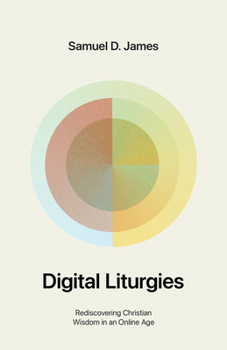
Digital Liturgies by Samuel D. James is a really helpful book to address how we are feeling these days as it relates to technology and the way it impacts our relationship with the Lord and with those He has called us to be in relationship with. We weren’t made to live on the other side of a screen all the time (sort of ironic as I prepare to post this on my blog and will no doubt share to social media.). The Lord has more for us…He created us for so much more.
I highlighted several things while reading and have posted them below. Also, while I was typing these up…I texted them to several friends and colleagues as well. So many helpful and sobering reminders!
- In just a few years, these digital technologies had gone from something we were all excited to try, to something we were all desperate to somehow escape (at least temporarily). p. 3
- One of the great things about being a Christian is that in a listless and frantic age, you don’t have to chase after every new idea or attitude. To be a Christian is to go to bed every night knowing that you have a completely trustworthy, completely solid, and completely good word from the Creator of the universe. p. 11
- How has the idea of a person being stuck in the “wrong body” become not just respected but orthodox in many circles? There are many legitimate answers, but this book offers an overlooked one: digital technology has recalibrated our worldviews and reshaped our consciences not to see the good givenness of our bodies. p. 30
- Technology is never neutral, because objects are made by people with an agenda of some sort.” from David Rooney’s About Time: A History of Civilization in Twelve Clocks (2021), p. 11
- Repetition, as much as it exasperates, is important. It can make us better at something. It can make a person faster and recite better. But most amazingly of all, repetition can actually change the kind of people we are. It turns out that in God’s providential design of our bodies, repetition has an astonishing power to reshape our minds, recalibrate our desires, and even redefine our beliefs. As we immerse ourselves in something time and time again, our thoughts, feelings, and intuitions begin to align with whatever that is. Especially if that thing is the internet. p. 50
- In our culture that prizes “authenticity” and places a premium on novelty and uniqueness, imitation has received a bad rap, as if being an imitator is synonymous with being a fake (think “imitation leather”). But the New Testament holds imitation in a very different light. Indeed, we are exhorted to be imitators. “Follow my example,” Paul says, “as I follow the example of Christ” (1 Cor. 11:1). Similarly, Paul commends imitation to the Christians at Philippi: “join together in following my example, brothers and sisters, and just as you have us as a model, keep your eyes on those who live as we do” (Phil. 3:17). Like a young boy who learns to shave by mimicking what he sees his father doing, so we learn to “put on” the virtues by imitating those who model the Christlike life. This is part of the formative power of our teachers who model the Christian life for us. It’s also why the Christian tradition has held up as exemplars of Christlikeness the saints, whose images were often the stained glass “wallpaper” of Christian worship… Such moral, kingdom-reflecting dispositions are inscribed in your character through rhythms and routines and rituals, enacted over and over again, that implant in you a disposition to an end (telos) that becomes a character trait—a sort of learned, second-nature default orientation that you trend toward “without thinking about it.” p. 55 from You Are What You Love: The Spiritual Power of Habit by James K.A. Smith (2016).
- One example (of how the internet transforms language) is hyperlinks, which allow words on the internet to contain in themselves access to other words. If those other words also have hyperlinks, then they contain in themselves access to more words. This potentially endless rabbit-hole effect in digital language changes how we process information, evaluate claims, or reflect on ideas. “Links don’t just point us to related or supplemental works; they propel us toward them. They encourage us to dip in and out of a series of texts rather than devote sustained attention to any one of them. Hyperlinks are designed to grab our attention. Their value as navigational tools is inextricable from the distraction they cause. from The Shallows: What the Internet Is Doing to Our Brains by Nicholas Carr, p. 90
- We demand shorter and shorter books that will accommodate our diminished focus and present to us more like what we read online. We are becoming less tolerant of friends who voice opinions we dislike, so accustomed we are to being able to mute or delete that which discomforts us. We are becoming much more anxious, unable to accept stillness or silence that cuts against our daily intake of new noise. These real, offline effects emerge from our online habits because, in God’s providential design, our minds are also brains-physical objects with pathways and neurons and adaptability. p. 62
- The reality is that the default in much of Western culture is to rely on internet technology to fill the gaps in our minds and hearts. We don’t know what we want to watch, so we click the “recommended” options. We don’t know what we want to think about, so our social media filters deliver us the posts that are algorithmically the most likely to get us to respond. We don’t know who our friends are, so we comb through the internet’s “suggested follows,” farming out our relationships to its technology. Our spiritual and intellectual menu is held by technologies that are designed not to help us savor what we find, but only to ensure that we binge, and then binge again. p. 63
- When we look deeply into digital technology, we see habits, beliefs, and desires that are constantly forming us. These habits, beliefs, and desires constitute digital liturgies – ways of living that are centered on a vision of the good life. p. 68
- We become self-appointed know-it-alls, eagerly skimming every controversial news story for confirmation bias while we curate feeds that constantly validate us. p. 80
- C.S. Lewis believed, rightly, that there was a difference between a genuine, diligent search for the truth and thinking in jargon. Jargon is what happens when the desire to be seen as a certain kind of person outweighs the desire to know what’s real. Jargon is what happens when the search for facts and ultimate reality gives way to a thirst for validation. To think in jargon is not to ask, Is this true? but, How will believing this reflect on me to others? p. 99
- Three Characteristics of genuinely Christian thinking:1. Christian thinking is careful.2. Christian thinking is truthful.3. Christian thinking is communal. p. 108
- The awareness of sin in us destroys our spiritual and emotional confidence in ourselves, and the realization that absolutely everyone around us shares in this sinful condition likewise destroys any naivety about the world we live in. p. 124
- A make-believe world of endless novelty, limitless consumption, and godlike power can cast a powerful spell. But in the end, its joys mold. p. 143
- Around the year 2000, the vast majority of mobile phones looked like what they were: devices for interpersonal communication. Flip phones are built to make natural contact with the user’s ear and mouth. By contrast, the large glass faces of smartphones are designed to be looked at. p. 156
- It’s not that my wandering attention span has nowhere else to go. It’s that digital environments beckon to me in a particularly powerful way. p. 157
- More subtle and perhaps even more important than discontent-ment, however, is the web’s minutiae of dislocation. Distraction and discontentment are serious challenges to a life of Christian wisdom. But both are really symptoms, not causes. Behind the life of distraction and discontentment is the life of dislocation, by which I mean a life in which deep belonging and rootedness feel like a disadvantage, and scattered, shallow omnipresence feels like power.Dislocation happens when we are not really where we are. That sentence is not a typo. When we are physically present somewhere from which we are emotionally, mentally, and relationally absent, dislocation occurs. Dislocation is the logic of imprisonment; we believe that a just punishment for committing a major crime is not to be starved or beaten but simply dislocated, to be forced to be physically present against our will. Dislocation is why we get homesick. We sense that we are not where we belong. p. 159
- Our addiction to distraction and our struggle against discontentment are both really expressions of the fact that our devices have made us feel elsewhere than we really are. We are split in two, dividing our attention and our lives. And in our quietest, most honest moments, we know the day-in, day-out burden of living this way is not sustainable. It’s not what we’re meant for. p. 161
- What if the foundation of a thought life that was characterized by truth, honor, purity, and excellence is a heart that has its anxieties quieted by the peace of God? p. 163
- First, the Bible lays out the wisdom we need to live faithfully and fruitfully before our Creator. Second, the internet is an epistemological and moral habitat that makes such wisdom seem like foolishness. p. 167
- Ask yourself some hard questions. When was the last time you read a book, listened to music, or had a conversation for more than an hour without checking your phone? When was the last time you sat alone with your thoughts with no email, no social media, and no streaming? I’m convinced many of us feel we don’t know how to focus, simply for lack of practice. Every area of life is saturated with noise; we fidget in moments of stillness and silence, instinctively wanting our devices to rescue us from such unsettling inactivity. Thus, a habit of resistance might begin merely with one hour each day that we intentionally retreat from digital technology. p. 172



